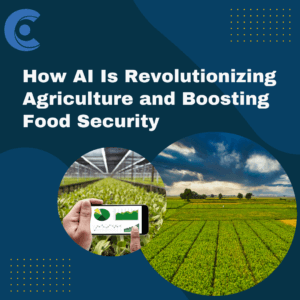How AI Is Revolutionizing Agriculture and Boosting Food Security

Artificial intelligence (AI) has the potential to transform various industries and tackle some of the most pressing global challenges. One of the sectors where AI is making significant strides is agriculture, where it is improving crop yields, enhancing sustainability, and boosting food security.
Agriculture has always been a complex and challenging industry, where farmers have to grapple with numerous variables, such as weather patterns, soil health, and pests. AI is helping farmers make data-driven decisions that increase efficiency, reduce costs, and minimize environmental impact.
Precision Agriculture with AI and IoT
AI and the Internet of Things (IoT) are being leveraged to create a more precise and efficient farming system, where farmers can collect and analyze data from various sources, including soil sensors, weather stations, and satellite imagery. By integrating this data with AI algorithms, farmers can make informed decisions on irrigation, fertilization, and crop protection, leading to improved crop yields and better resource management.
For example, IBM’s Watson Decision Platform for Agriculture analyzes data from various sources, such as weather forecasts, soil moisture sensors, and satellite imagery, to provide farmers with customized insights and recommendations on when to plant, water, and harvest crops. This helps farmers optimize their inputs, reduce waste, and increase profits.
AI-Powered Crop Monitoring and Disease Detection
Crop monitoring is a critical aspect of agriculture, as it helps farmers detect potential problems and take corrective actions before they become significant issues. AI is being used to develop sophisticated crop monitoring systems that can identify changes in plant growth, detect pests, and predict yield.
Deep learning algorithms can analyze thousands of images of crops and identify patterns that are not visible to the human eye. This helps farmers detect diseases and pests early and take immediate action to prevent the spread of the infestation.
For example, the Plantix app uses AI-powered image recognition technology to identify plant diseases and provide farmers with customized recommendations on how to treat them. This saves farmers time and money, reduces the use of pesticides, and boosts crop yields.
AI and the Future of Agriculture
AI is still in its early stages of development in agriculture, but the potential benefits are enormous. As the global population continues to grow, and the demand for food increases, farmers will need to find more efficient and sustainable ways to produce food.
AI can help farmers achieve this by providing them with real-time data and insights, improving crop yields, and reducing waste. Moreover, AI can help address some of the most pressing environmental challenges, such as soil erosion, water scarcity, and climate change, by enabling farmers to make informed decisions that promote sustainability.
In conclusion, AI is transforming agriculture, and its potential to revolutionize the industry is significant. As farmers embrace new technologies and tools, they can improve their yields, reduce waste, and create a more sustainable food system that can feed a growing population
Which all AI tools can you list to help agritech to boost performance ?
